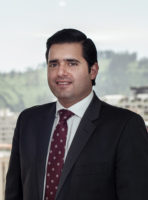Cannabinoid Drugs, Medicinal Cannabis and Opioid Drugs
Corral Rosales / Ecuador
An intro to the legal situation for medical cannabis, cannabinoid drugs and opioids in Ecuador. Prepared in association with Corral Rosales, a leading global law firm, this is an extract from The Pharma Legal Handbook: Ecuador, available to purchase here for GBP 75.
Cannabinoid Drugs
1. Are Cannabinoid Drugs authorized in your country?
On September 17, 2019, the Congress approved the production, commercialization, distribution, use and consumption of cannabis for medicinal or therapeutic uses in the country.
lArt. 220 of the Criminal Code, provides: “(…) The possession or possession of drugs that contain the active principle of cannabis or derivatives for therapeutic, palliative, medicinal purposes or for the exercise of alternative medicine in order to guaranteeing health will not be punishable, provided that the suffering of a disease is proven through a professional diagnosis. (…) ”;
On February 10, 2021, the Sanitary Technical Regulations for the Regulation and Control of Finished Products for Human Use and Consumption Containing Non-Psychoactive Cannabis or Hemp, or Non-Psychoactive Cannabis Derivatives or Hemp, were approved, thus allowing registration of drugs that contain cannabis or hemp in their composition.
2. What are the regulatory authorities with jurisdiction over Cannabinoid Drugs?
The Internal affairs Ministry.
The Health Ministry.
National Agency for Regulation, Control and Sanitary Surveillance (ARCSA).
3. Is there a specific regulatory framework for the authorization, pricing, and reimbursement of Cannabinoid Drugs?
No
4. Which are the cannabinoid drugs that have received market approval to date?
None.
The Regulations for Cannabinoid Drugs is still under study.
Pharmaceutical products not subject to control are considered to be drugs in general, processed natural products for medicinal use and homeopathic products that have predominantly cannabidiol (CBD) and cannabis or cannabis derivatives in their formulation, as appropriate, with a percentage lower than 1% of delta-9-tetrahydrocannabinol (THC).
All products for human use and consumption that contain in their formulation cannabis or cannabis derivatives with a percentage equal to or greater than 1% of THC will be regulated as drugs that contain listed substances subject to control.
5. Who can prescribe Cannabinoid Drugs?
The draft Regulations for the Prescription, Commercialization and Transport of Drugs containing substances subject to control (Narcotic Psychotropic Drugs) and the Supply and Control of Special Prescriptions, establishes:
“Health professionals authorized to prescribe drugs containing narcotic or psychotropic substances are:
- Physicians (general and specialist); and
- Dentists.
The prescription of drugs containing narcotic and psychotropic substances, by dental professionals authorized to prescribe, must be tied to user / patient treatment protocols approved by the National Health Authority.
6. Is there a list of doctors authorized to prescribe Cannabinoid Drugs?
Not yet.
7. What approvals or notifications are required to prescribe Cannabinoid Drugs?
The draft Regulation for the Therapeutic Use, Prescription and Commercialization of Medicinal Cannabis and Pharmaceutical Products containing Cannabinoids, proposes: Health professionals approved to prescribe controlled drugs that contain cannabinoids with a THC concentration equal to or greater than 1% are those authorized to issue special prescriptions. Said prescription will be issued in accordance with the medical conditions detailed in article 4 of these Regulations and in accordance with the provisions of the treatment protocols for national or international use.
Health professionals authorized to prescribe pharmaceutical products containing cannabinoids in a THC concentration of less than 1% are health professionals authorized to prescribe, with a professional license issued by a Higher Education Institution recognized by SENESCYT or whoever has these duties and registered with the National Health Authority. Said prescription shall contemplate what is listed in these regulations, and in accordance with the provisions of the recognized treatment protocols for national or international use.
8. Which organizations are authorized to sell/distribute Cannabinoid Drugs available?
The Draft Regulation for the Therapeutic Use, Prescription and Commercialization of Medicinal Cannabis and Pharmaceutical Products containing Cannabinoids, states:
The commercialization and sale of drugs containing cannabinoids and a THC concentration equal to or greater than 1% may only be carried out by private pharmacies and pharmacies of public and private health facilities, which have the corresponding operating permit granted by the ARCSA or ACESS, respectively, upon evidencing a Special Prescription for drugs containing listed substances subject to control, duly signed by the health professional authorized to issue special prescriptions, as established in this Regulations.
The commercialization and sale of pharmaceutical products containing cannabinoids in a THC concentration of less than 1% may only be carried out by private pharmacies and medicine cabinets and pharmacies of public and private health facilities that have the corresponding operating permit granted by the ARCSA or ACESS, respectively, upon evidencing a Special Prescription for drugs containing listed substances subject to control, duly signed by the health professional authorized to issue special prescriptions, as established in this Regulations.
9. Is there a list of retailers/distributors authorized to sell Cannabinoid Drugs?
No.
10. Are there proposals for reform or significant change to the regulation of Cannabinoid Drugs?
Currently there is no reform under discussion to the Criminal Code (COIP). The Sanitary Technical Regulations for the Regulation and Control of Products for Human Use and Consumption that contain non-psychoactive Cannabis or hemp, or its derivatives, are in a draft stage.
11. When are they likely to come into force?
N/A.
Medicinal Cannabis
12. Is Medicinal Cannabis authorized in the country?
On September 17, 2019, the Congress approved the production, commercialization, distribution, use and consumption of cannabis for medicinal or therapeutic uses in the country.
Art. 220 of the Criminal Code, provides: “(…) The possession or possession of drugs that contain the active principle of cannabis or derivatives for therapeutic, palliative, medicinal purposes or for the exercise of alternative medicine to guaranteeing health will not be punishable, provided that the suffering of a disease is proven through a professional diagnosis. (…)”
13. What are the regulatory authorities with jurisdiction over Medicinal Cannabis?
The Internal affairs Ministry
The Health Ministry
National Agency for Regulation, Control and Sanitary Surveillance (ARCSA).
14. What is the regulatory framework for the authorization, pricing, and reimbursement of Medicinal Cannabis?
The authorization of sale, pricing and reimbursement of medicinal cannabis are not regulated yet.
15. How is the production and import of Medicinal Cannabis regulated and by which agencies/authorities?
The production and importation of non-psychoactive hemp seeds is regulated by the Ministry of Agriculture.
The National Agency for Regulation, Control and Health Surveillance ARCSA will oversee medicinal cannabis.
16. What approval or notifications are necessary to produce or import Medicinal Cannabis?
The import, planting, cultivation, harvest, post-harvest, storage, transportation, processing, commercialization and export of non-psychoactive Cannabis or hemp and hemp for industrial use is regulated by the Ministry of Agriculture under Ministerial Agreement No. 109. In The Sanitary Technical Regulations for the Regulation and Control of Products for Human Use and Consumption that contain non-psychoactive Cannabis or hemp, or its derivatives, which is in a draft stage, sated: The manufacture of drugs in general, processed natural products for medicinal use and homeopathic products that contain in their formulation cannabis or cannabis derivatives, as appropriate, in a percentage lower than 1% of THC should only be carried out in pharmaceutical laboratories that have the permission. of current operation granted by the ARCSA and must have a current certification of Good Manufacturing Practices, according to the regulations issued for that purpose.
Drugs in general, processed natural products for medicinal use and homeopathic products that contain in their formulation cannabis or cannabis derivatives, as appropriate, in a percentage lower than 1% of THC must be marketed in pharmaceutical establishments authorized for this purpose by the ARCSA, in accordance with the activity described in its operating permit, with the sale method determined during the process of granting the corresponding marketing authorization, in accordance with current regulations.
For the importation of cannabis derivatives that will be used in the manufacture of pilot batches of drugs in general and that have not yet obtained the corresponding marketing authorization, the legal representative of the interested party must upload through ARCSA’s management system -Quipux-, a request for each import of the raw material to produce the pilot batch or batches. The following requirements apply:
- Composition formula of the product to be produced as pilot batches which describes and justifies the use and quantity of the cannabis derivative per pilot batch;
- Establishment where the pilot lots will take place;
- Execution schedule of the pilot batch;
- Invoice or proforma of the raw material addressed to the manufacturing establishment of the pilot batch;
- Official fee;
- Product elaboration process to be carried out in the pilot batch; and
- Technical data sheet and certificate of analysis of the raw material to be used, from the country of origin.
17. What is the regulatory framework for the marketing and distribution of Medicinal Cannabis?
There are currently no regulatory frameworks for the marketing and distribution of medicinal cannabis.
However, in the draft Regulations for the Regulation and Control of Products for Human Use and Consumption that contain non-psychoactive Cannabis or hemp, or its derivatives, it is proposed:
Drugs in general, processed natural products for medicinal use and homeopathic products that contain in their formulation cannabis or cannabis derivatives, as appropriate, in a percentage lower than 1% of THC must be marketed in pharmaceutical establishments authorized for this purpose by ARCSA, in accordance with the activity described in its operating permit, with the sale method determined during the marketing authorization process, in accordance with current regulations.
18. How can patients obtain Medicinal Cannabis?
Currently not possible.
19. Who can prescribe Medicinal Cannabis?
Currently, nobody.
20. Is there a list of doctors authorized to prescribe Medicinal Cannabis?
No
21. What approvals or notifications are required to prescribe Medicinal Cannabis?
It is currently not possible to prescribe medicinal cannabis.
22. Where is Medicinal Cannabis available?
Currently not available.
23. Is there a list of retailers authorized to sell Medicinal Cannabis?
No
24. Are there proposals for reform or significant change to the regulation of Medicinal Cannabis?
Currently there is no reform under discussion to the Criminal Code (COIP). The Regulations for the Regulation and Control of Products for Human Use and Consumption that contain non-psychoactive Cannabis or hemp, or its derivatives, are in a draft stage.
Opioid Drugs
25. Are Opioid Drugs authorized in your country?
Yes
26. What are the regulatory authorities with jurisdiction over Opioid Drugs?
Ministry of Health
National Regulatory Agency (ARCSA)
27. Is there a specific regulatory framework for the authorization, pricing, and reimbursement of Opioid Drugs?
Yes, for the registration of an opioid medication there are certain requirements, as follows:
- Register with ARCSA as an importer / vendor / distributor of medications that contain substances categorized as subject to control.
- Certificate of administration of substances categorized as subject to control, issued by the Technical Secretary of Drugs (SETED) – if registering with ARCSA as producer.
- Annual projections of consumption of imported medications that contain substances categorized as subject to control.
- List of possible clients (if registering as vendor).
The Ministry of Health will set the maximum price for the sale of these medications, through the Technical Secretary for Medication Price Control.
28. Which are the Opioid drugs that have received market approval to date?
There are various opioids registered in Ecuador, either as combination drugs or mono drugs. The main ones are as follows:
- Hydrocodone
- Oxycodone
- Morphine
- Codeine
- Methadone
- Fentanyl
29. Who can prescribe Opioid Drugs?
Health professionals authorized for the prescription of medications that contain substances categorized as subject to control (opioids).
30. Is there a list of doctors authorized to prescribe Opioid Drugs?
Yes, the Minister of Health maintains an up-to-date register of authorized professionals.
31. What approvals or notifications are required to prescribe Opioid Drugs?
Be a health professional that treats illnesses which have shown effective therapeutic responses to the use of opioids. Such professional must be authorized by the Minister of Health.
32. Which organizations are authorized to sell/distribute Opioid Drugs available?
Authorities that are registered with ARCSA for the purpose of the administration of medications that contain substances categorized as subject to control (opioids).
33. Is there a list of retailers/distributors authorized to sell Opioid Drugs?
The Minister of Health holds an up-to-date list of which distributors may sell these medications.
34. Are there proposals for reform or significant change to the regulation of Opioid Drugs?
No.
35. When are they likely to come into force?
N/A

























































